Twenty-two clergy, lay leaders complete OCA’s Third Mission School
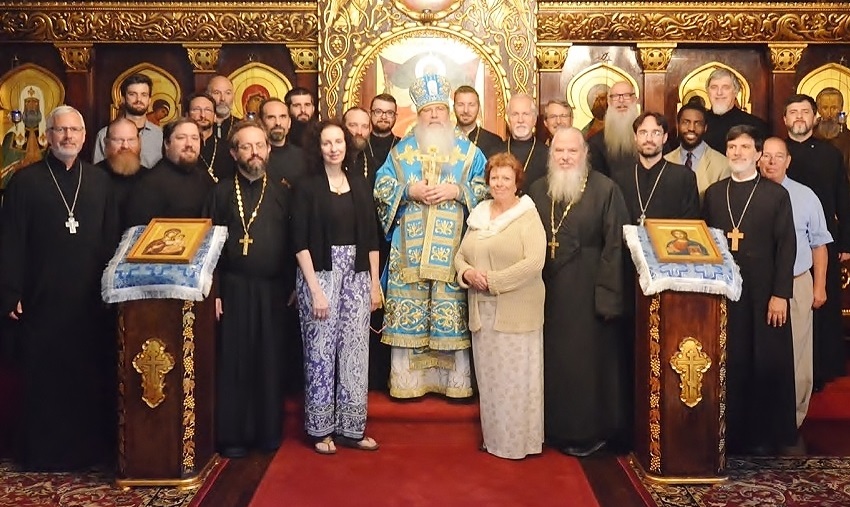
Twenty-two clergy and lay leaders representing every diocese of the Orthodox Church in America completed the third annual Mission School held on the campus of Immaculate Conception Seminary here August 21-25, 2017.
“The school was organized with the blessing of the Holy Synod of Bishops and funded through a bequest to the OCA earmarked for missions and evangelism,” said Archpriest Eric G. Tosi, OCA Secretary and Mission School organizer. “The school brings together one clergyman and one lay person from each diocese of the OCA. The week long program offers an intensive study on the theory and practice of mission and evangelism.”
His Beatitude, Metropolitan Tikhon led Wednesday’s discussions, while His Eminence, Archbishop Michael led Tuesday’s presentation. Other clergy seasoned in the mission field presented a series of talks, evaluations and round table discussions. Among them were Archpriest John Jillions, OCA Chancellor; Archpriest Steven Voytovich, Dean of Saint Tikhon Seminary; Archpriest Chad Hatfield, President of Saint Vladimir’s Seminary; Archpriest David Rucker of Saint Herman Seminary and OCMC; Archpriest John Parker, Chair of the Department of Evangelization; Archpriest Timothy Hojnicki, Rector of Holy Apostles Church, Mechanicsburg, PA; Archpriest Thomas Soroka, Rector of Saint Nicholas Church, McKees Rock, PA; Archdeacon Joseph Matusiak, Secretary to the Metropolitan and Chair of the Stewards of the Orthodox Church in America; and Matushka Jennifer Mosher, Saints Peter and Paul Church, Meridan, CT.
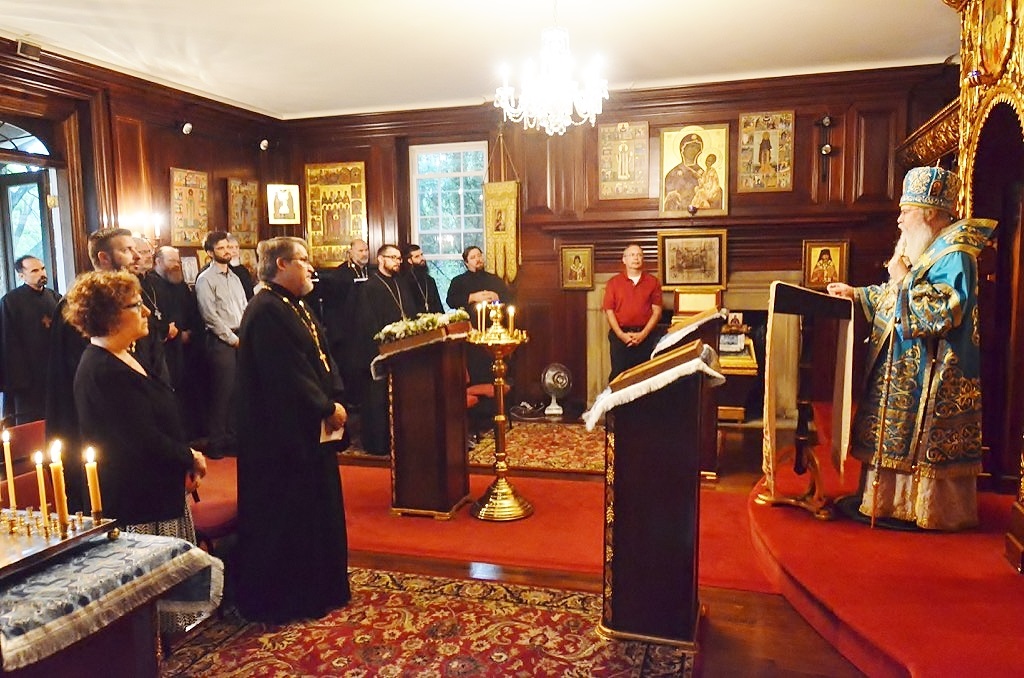
“The topics covered subjects as diverse as the theology of evangelism and mission, sacramental and liturgical practices in a mission community, developing a catechism and education program in a mission, community building, engaging contemporary society, stewardship, and parish revitalization as mission,” Father Eric explained. “Each day incorporated worship, evaluation exercises and open discussions. Each participant received a certificate of completion from His Beatitude as well as a host of reading and study materials.”
To date, nearly 100 clergy and lay persons have completed the Mission School and have brought back the lessons learned to their parishes, deaneries and dioceses.
Metropolitan Tikhon celebrated the Divine Liturgy for the Leavetaking of the Great Feast of the Dormition on Wednesday morning, during which he delivered a stirring homily, the text of which appears below.
A photo gallery can be viewed on the OCA web site and Facebook page.
August 22, 2017
Leavetaking of the Dormition of the Mother of God
Mission School 2017
Saint Sergius Chapel
Philippians 2:5-11
Luke 10:38-42; 11:27-28
In the Name of the Father, and of the Son, and of the Holy Spirit.
“That at the name of Jesus every knee should bow, of those in heaven, and of those on earth, and of those under the earth, and that every tongue should confess that Jesus Christ is Lord, to the glory of God the Father” [Philippians 2:10-11].
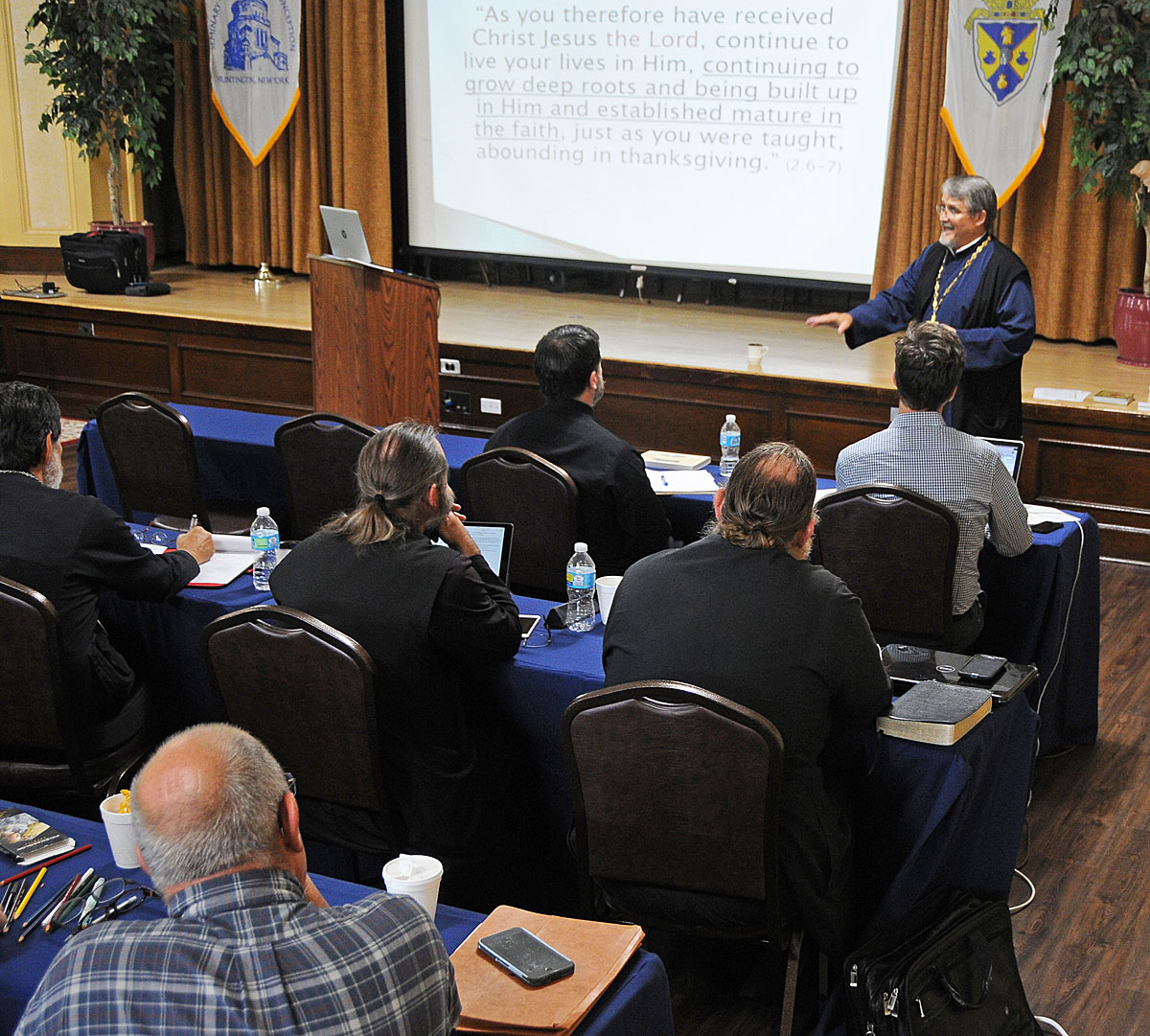
My dear brothers and sisters in Christ,
Are not these concluding words from today’s Epistle a beautiful expression of the goal of our missionary work as Christians? They are certainly fitting words with which to conclude our celebration of the life-affirming feast of the Dormition of the Most Holy Theotokos. But connecting the Mother of God and our Apostolic work in the vineyard of the Lord, there is a common thread. Just as it is through the Mother of God that our Lord came into this world and by her that it became possible for every knee in heaven and on earth and under the earth to bow before the name of Jesus Christ, so it is that each of us, ordained and not ordained, married and monastic, young and old, have a part in striving for the glorious outcome that every tongue should confess that Jesus Christ is the Lord, to the glory of God the Father.
Although we could look to the Gospel to bring us to the heart of our theology, and then to the application of that theology as a way of life, by focusing on the bringing together of the contemplation of Mary and the action of Martha as a model for missiology, it is rather on the words of the Epistle reading that I would like us to draw our attention, especially this week, as we gather together to learn from one another about our task as Apostles of Jesus Christ.
“Let this mind be in you which was also in Christ Jesus…” [Philippians 2:5].
Paul repeatedly throughout his letters makes Christ the pattern for our thinking, not only our behavior. In Romans he says, “be renewed on the transforming of your minds.” It often happens that we work on shaping our behavior before our minds are fully convinced, but in the end our whole being and behavior are called to transformation in Christ, guided by an inner being—heart, soul and mind—shaped entirely by Christ. There can be no missionary work, no proclamation of the Gospel, no healing of the illnesses and brokenness of the world, if we ourselves have not begun to have our entire being shaped by Christ.
”...Who, being in the form of God, did not consider it robbery to be equal with God…” [Philippians 2:6].
We believe that Christ is the pre-eternal Word of God, that He exists from all eternity in loving communion with the Father and the Holy Spirit, that He is fully divine. His divinity was not an illegitimate “add-on.” He was not grabbing a state of being that did not belong to Him. This is what Saint Paul means by “robbery.” He was God from the beginning, from before there was a beginning. This is, in summary form, the most profound expression of our theology, one which we long to share with the world, but often find ourselves mute and unable to adequately convey this divine reality to our fellow human beings, who would prefer their gods to be mortal and of the earth. What can we do? Saint Paul gives us a clue:
”...but [He] emptied Himself, taking the form of a bondservant, and coming in the likeness of men. And being found in appearance as a man, He humbled Himself and became obedient to the point of death, even the death of the cross” [Philippians 2:7-8].
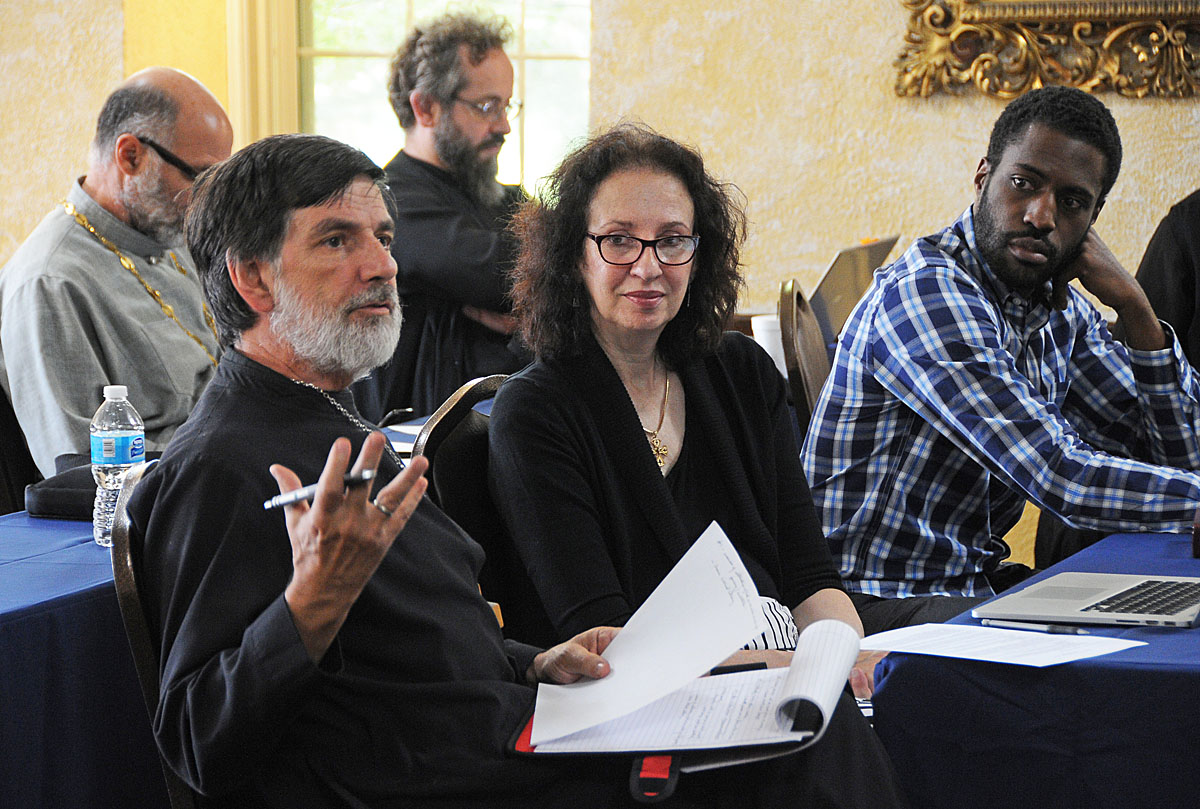
Christ did not hold on to His divine status but voluntarily emptied Himself, or as some translations say, He made Himself of no reputation. God refused to look on at the misery, grief, confusion and sin of the world at a distance. Instead, out of supreme love, He desired to share that world with us, alongside us, with none of the privileges of divinity. He shed His divine distance and entered the messiness of the world.
But He did this only with the cooperation and collaboration of the Theotokos. This in itself is remarkable, but it is even more remarkable when we recognize that we can do the same. It can be said that God sets aside His omnipotence and waits for His servant, Mary, to say “yes.” And without her “yes” He willingly binds Himself to be powerless to effect the salvation of the world. We often say, “only God can save.” In an important sense that is not true. God, in His love for mankind, in His desire to preserve human freedom so that love for God remains free, limits Himself and says, “I need Mary’s freely given ‘yes’ in order to save the world.” This is why we Orthodox can say without reservation, “Most Holy Theotokos save us.” And He says the same to each of us: “I need your help in order to save you. I can’t save you against your will.” And this is what should motivate our missionary labors today: to imitate the self-emptying, the kenosis, not only of the great saints of our Church, not only of the Theotokos, but of God Himself. For it is a self-emptying that leads to the fullness of divine glory:
“Therefore God also has highly exalted Him and given Him the name which is above every name, that at the name of Jesus every knee should bow, of those in heaven, and of those on earth, and of those under the earth, and that every tongue should confess that Jesus Christ is Lord, to the glory of God the Father” [Philippians 2:9-11].
In emptying Himself, God demonstrates His glory. This is why in icons of the crucifixion we often see the phrase, “the King of Glory.” The Mother of God shows us as well the most excellent way of humility which paradoxically leads to exaltation. Neither the tomb, nor death could hold the Theotokos, and her falling asleep becomes translation to life.
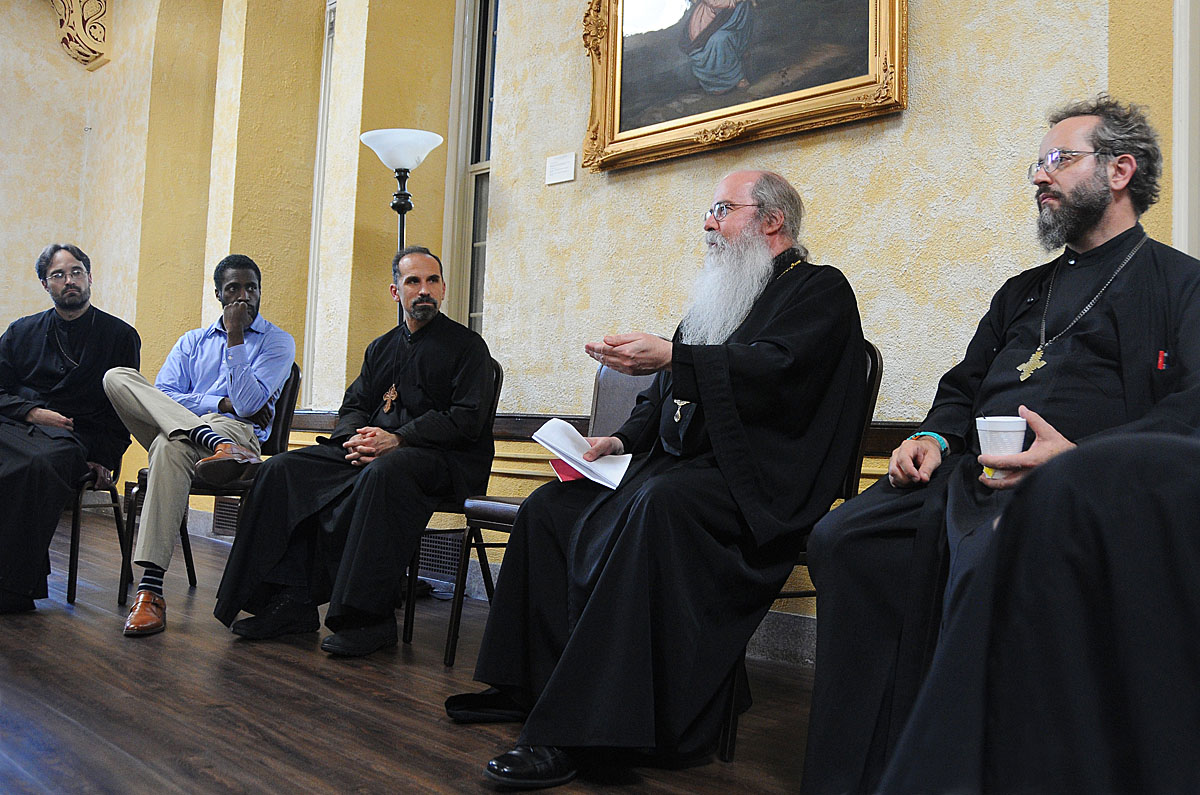
Archimandrite Zachariah, from the Monastery of Saint John the Baptist in England, says that self-emptying love for all and humility before all is our practical pattern of life as Christians. [See Man the Target of God, Monastery of Saint John the Baptist, 2016, pp 158-160.] He writes, “I think that even in our ministry if we learn to humble ourselves and we put ourselves below the people we try to serve, in the end we will enjoy more authority and we will do more than by behaving with authority as priests of the Most High. We cannot have a true relationship with anybody, neither with friends, nor with husband and wife, unless we put ourselves below the other person. Even with our own children, we have to put ourselves below them, come down to their level at least, reasoning with them as with our equals, and not with parental authority. If we behave with them with parental authority we will not convince them and they will not follow us…. In fact, what makes our preaching unconvincing to the surrounding world is the fact that we, and first myself, do not have this self-denial which the commandment of the Lord demands…. What I mean to say is this: In our ministry we need to be humble and not behave with authority. It is a temptation that many priests have especially in traditionally Orthodox countries, but when we live in the Diaspora, in America or in England, we cannot get anywhere in that way. The only way to convince people in the Church is by showing a humble example and putting ourselves below the people that we try to serve.”
The Mother of God not only gives us this example, but she is also ever-present to listen and to intercede. And we, the Apostles and Missionaries of Christ, should likewise strive for this life of self-emptying humility, which is the only means by which we can truly proclaim the glory of God, the light of the resurrection and ourselves become vessels for the life of the world.
By the prayers of the Mother of God, may we once again commit ourselves and each other and all our life to Christ our God and to His self-emptying humility.
